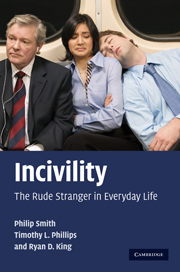Book contents
- Frontmatter
- Contents
- List of figures and tables
- Preface and acknowledgements
- 1 Redirecting incivility research
- 2 The fundamentals of the incivil encounter
- 3 Everyday incivility and the everyday round
- 4 Emotions and sequences
- 5 Gender, age and class: divergent experiences?
- 6 After the event: coping, avoiding and changing
- 7 General attitudes towards the stranger: exploring fear and trust
- 8 How to confront incivility
- 9 Twenty questions and answers
- References
- Index
9 - Twenty questions and answers
Published online by Cambridge University Press: 05 June 2012
- Frontmatter
- Contents
- List of figures and tables
- Preface and acknowledgements
- 1 Redirecting incivility research
- 2 The fundamentals of the incivil encounter
- 3 Everyday incivility and the everyday round
- 4 Emotions and sequences
- 5 Gender, age and class: divergent experiences?
- 6 After the event: coping, avoiding and changing
- 7 General attitudes towards the stranger: exploring fear and trust
- 8 How to confront incivility
- 9 Twenty questions and answers
- References
- Index
Summary
We have tried to be as clear as possible in this book and to write scholarly material in a way that will appeal to a general audience. Still, books like this one can be wordy. Also the complex statistical tables can result in an overload of information, especially for general readers. Although we have included summary bullets at the end of each chapter, we would like to conclude with a more crisp and conversational outline of what we have discovered and what remains to be found out.
The following series of questions and answers replicates what we are often asked during both academic seminars and public talks. It offers a shortcut to the entire book. Scholars who require higher academic standards and a more serious tone, or those looking for extra information after reading an answer here must return to the book itself.
Why research the rude stranger?
Rudeness is a commonplace feature of everyday life. It impacts upon pretty much everyone. We should know about it. In the mass media and on the Internet we find a lot of chatter about this. Politicians often crusade for civility. Academic researchers looking at social capital, crime and everyday life have important things to say on these topics. Their ideas have substantially influenced policy and political agendas (Chapter 1).
Don't we already know a lot about rudeness?
No. We really have no idea at all.
Information
- Type
- Chapter
- Information
- IncivilityThe Rude Stranger in Everyday Life, pp. 193 - 201Publisher: Cambridge University PressPrint publication year: 2010
